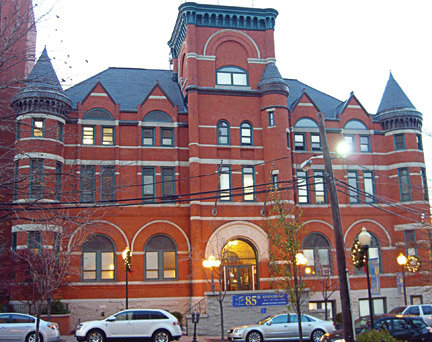Even though a state agency has written into its policy that towns receiving certain type of state aid can’t give benefits to their part-time elected officials, Union City has avoided questions of whether their mayor and council are receiving the benefits – and they have postponed responding to an Open Public Records Act (OPRA) request for the information.
Meanwhile, the state of New Jersey’s Department of Community Affairs (DCA) was uncharacteristically tight lipped as well when asked whether Union City has been given an exemption.
One gadfly and former Union City official has been asking questions about the matter. After writing a letter to the DCA about it, private investigator and former Union City Deputy Police Chief Joseph Blaettler charged that Democratic Mayor Brian Stack is receiving special treatment because he is allied with Republican Gov. Chris Christie.
Prohibited
Last year, the DCA stated in its 2011 First Annual Report that, while exemptions are possible, municipalities receiving transitional aid are prohibited from “providing health care to part-time officials, elected or otherwise.”
In fact, the DCA cracked down on the town of Harrison last year for what they considered to be a waste of taxpayer dollars.
“[They] discovered a situation whereby the Town was providing health benefits for nine elected officials that cost the taxpayer over $200,000 annually,” said the 2011 report related to state transitional aid given out to various towns. “The Town was directed to eliminate or reduce this unsustainable level of compensation and the Town eliminated health benefits for elected officials by resolution.”
Blaettler charged that Democratic Mayor Brian Stack is receiving special treatment because he is allied with Republican Gov. Chris Christie.’
____________
Union City is led by five part-time commissioners, one of whom also serves as part-time mayor. Stack received $16,000 in his position last year, and the commissioners received $15,500. One source said they are also receiving city health benefits.
Stack also serves as a state senator part-time, representing Union City, Hoboken, and part of Jersey City, among other towns.
When asked two weeks ago if Union City was granted an exemption, the DCA responded with an e-mail staying simply, “DCA has no comment on this matter.”
Harrison’s actions “helped the community better manage itself,” according to the report.
Stack and his spokesman declined to answer whether or not they are receiving health benefits, and an OPRA request was made to obtain that information two weeks ago. By law, OPRA requests must be filled within seven business days. An employee in the city clerk’s office said last week that the request has been sent to the city’s lawyers for review.
Counsel for the New Jersey Press Association Tom Cafferty stated Wednesday that sending an OPRA request to corporation counsel is not a valid reason to exceed the seven-day time frame.
The city employee also said that the Reporter was not the only entity who had made an OPRA request for the public information.
b>Special treatment?
In a letter he sent to the DCA, Blaettler praised the DCA for taking action in Harrison and questioned why they may have overlooked matters in Stack’s municipality.
Blaettler has brought to light several scandals in Union City government in the last two years, one of which resulted in a state attorney general’s investigation into the police chief, and another that forced the mayor’s ex-wife to pay back money to the town. Stack has distanced himself from both of those matters.
Blaettler wrote in a June 18 letter, “Why is it that you took action against elected officials in Harrison, but you have taken no action against Mayor Stack and his commissioners?” Then he added, tongue-in-cheek, “I am sure the fact that Mayor Stack is a good friend of Governor Christie, and serves in the State Senate had no bearing on this issue.”
In October, it was announced that Union City was one of five New Jersey towns to be splitting $117.1 million in state aid that previously had been taken away. The other towns were Camden, Lawnside, Paterson, and Trenton. Union City received $12 million in 2011 and $13 million in 2010.
However, to receive the aid, the city had to agree to state oversight and demonstrate they are making steps toward improving their financial situation. Among other fiscal reforms, Cities were required to have a “pay-to-play” law on the books in order to get the aid. Pay-to-play laws limit campaign donations from firms wanting to do work for the city.
But newspaper reports said last February that Stack had claimed on the documents that the city had the law on its books when it didn’t.
At the time, Stack responded that the city was in the process of passing such a law.
In February of 2012, the Board of Commissioners voted a pay to play ordinance into effect, and then the city received its $12 million in aid.
In March, a DCA spokesperson told NJ.com, “The Division recognized that to withhold Transitional Aid from the city would have jeopardized their fiscal stability, and consequently, punished taxpayers.” A spokesman said the DCA had no reason to believe Stack was misleading them because he sufficiently demonstrated that the city was in the process of adopting the necessary ordinance.
The 2011 state report also stated that the DCA worked with Union City to limit their new hires, deny some personnel requests, help obtain a finance director, and encourage them to charge a fee for recreational programs, among a few other reforms.
Gennarose Pope may be reached at gpope@hudsonreporter.com
